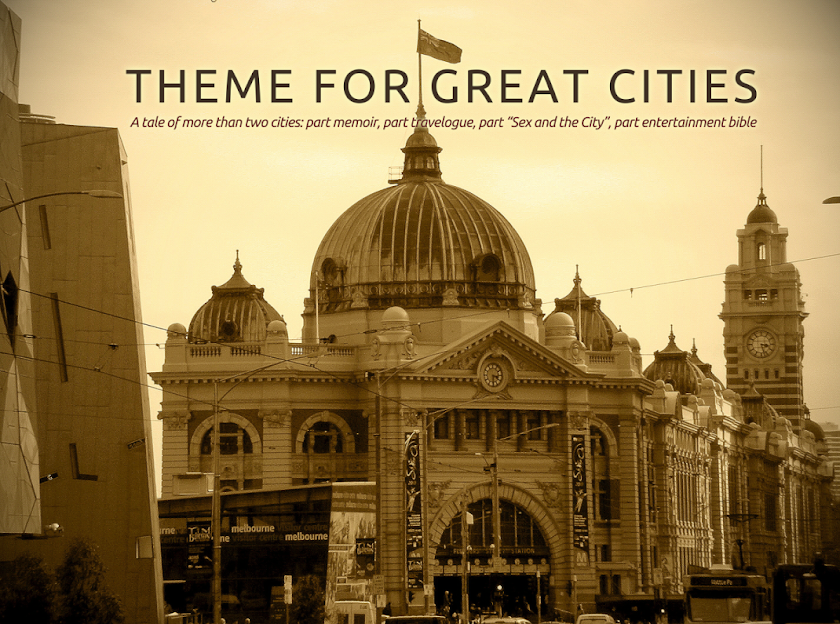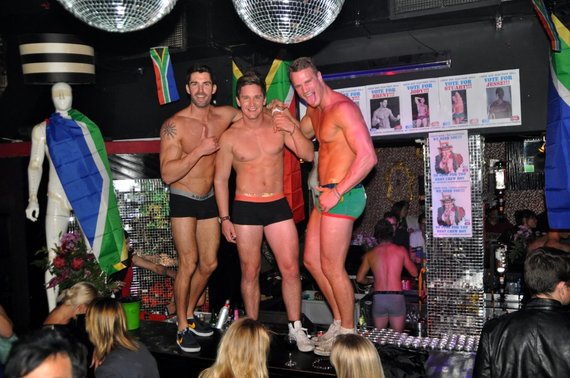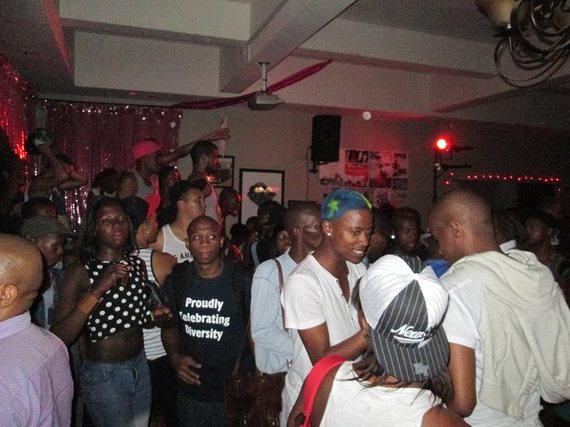If there are two things I've come to realize about gay men during my eight-year, five-continent expat tour, the first is this: They're pretty much the same all over.
No matter where you call home, you'll encounter guys who are just after "fun," ones who only care whether you're a top or bottom, and ones who'll blow you off. (I once was stood up six times in one week in Buenos Aires!) In my case, everywhere I've lived, there's been no escaping the dreaded question that's been the bane of my existence abroad: "Is it true what they say about black men?"
Frustrating as it is, I get it. In countries where black men are a rarity, like Argentina, Australia and Thailand, there's bound to be curiosity. But I never would have expected to find so many white men who claim to have never gone black in Cape Town. What's with the mystique here? It's South Africa: There are black men everywhere. According to the 2011 Census, blacks make up 39 percent of Cape Town's population, compared to whites' 16 percent, a minority that still holds the majority of the city's economic power while dominating its international image.
Which brings me to my second realization about gay men while living abroad: The more they stay the same in different countries, the more they change. You start to notice trends and subtle differences that might be barely perceptible to the naked eye without months of experiences and the corroboration of people who've had similar ones. I received my first inkling that dating in Cape Town would be a new and distinct challenge one week in, courtesy of Edward, a black American who had been living and studying here for one year.
Over Sunday-afternoon drinks, he made an offhand comment about the peculiar politics of dating in Cape Town. When we met up a few days later, I started to really get what he was talking about after he showed me a message he'd received from a white South African on Grindr. Edward had approached the guy, who offered the sort of specific, detailed response one might actually expect in a country that is but 20 years removed from institutionalized racial segregation.
"I'm sorry, but I do not believe in the crossing of racial barriers."His words read like an impersonal formal rejection letter in response to the unsuccessful applications of all nonwhite suitors. Edward assured me there were plenty of others just like him. In a city in which everyone, white and black, had been perfectly pleasant to me since my arrival from the more traditionally "African" (i.e., black) Johannesburg, where I'd had several racial epiphanies over five days, it was solid evidence that despite the official end of apartheid in 1994, it was still lurking in dark corners.
I had seen the dynamic myself when I went out on my fifth night in town. In Zer021, the first gay club we went to ("we" being a black American, a black African, a white South African and me), the Friday-night crowd was almost exclusively black. A few blocks away at Crew, the most popular gay club in Cape Town, practically everyone was white. Crew easily could have been a bar on Oxford Street in Sydney, or one in Harrisburg, Pennsylvania. In sharp contrast to my previous experiences at Glam in BA, The Peel in Melbourne and DJ Station in Bangkok, I felt invisible and ignored there, as I still generally do in all of the gay-friendly establishments in the De Waterkant district, except for at Zer021 and among the black-African staff at Piano Bar.
For me, Cape Town has been a tale of several cities. In one, there's great diversity and contrast, with many different colors and shades converging and diverging. On one street -- Long, for instance -- you can be surrounded by black and "coloured" (mixed-race) people, while just a few blocks away -- on Kloof, or on Bree -- the bar and restaurant clientele suddenly fades from mostly black to almost totally white.
In another Cape Town -- say, an area like Hout Bay, where impoverished townships crumble adjacent to opulent mansions -- it's black, and it's white, separate and not even remotely equal. In yet another, the one that seems to exist in the minds of so many of its inhabitants, or in De Waterkant's "gay village," or on Grindr, I'm James Baldwin in my favorite chapter of Notes of a Native Son: the same but different, a true stranger in the village.
After six months in the city, black gay Cape Town remains somewhat a mystery even to me, which might partly explain the continuing gay mystique surrounding black men here. The first shocking thing I noticed on Grindr in Cape Town was the abundance of white faces and the dearth of black ones among the profiles. I reasoned that perhaps black Africans are less likely to show their faces on a gay meat-market app because they're more likely to be closeted due to disapproving family and friends. Indeed, at least half of the photo-less messages I've received in the last six months have been from "discreet" black guys in their early 20s who are clearly not out.
(I'm setting aside Cape Town's "coloured" population for now because I'm still in the process of trying to negotiate that beige area and fully understand the term, but from what I've seen and heard, integration for that 42 percent majority remains sorely lacking.)
The second shocking thing I noticed on Grindr? The white guys who approached me (and they were considerably fewer in number than they had been in Buenos Aires, Melbourne and Bangkok) were generally more brutal and crude than the ones who approached me anywhere else. Many of them didn't even bother with perfunctory niceties, just diving right in: Show me your dick... now!!!
Those with slightly more finesse rarely seemed to be interested in meeting in public. I might have continued to chalk this up to impatience and extreme horniness had it not been for a Grindr exchange that Edward showed me in which he and a suitor seemed to be having two completely different conversations. Every time Edward made some attempt to establish a human connection by suggesting meeting up for a drink first, the guy responded by insisting on quick, anonymous and, most importantly, clandestine, sex. "NSA" = No socializing allowed!
A year of experience had led Edward to a conclusion that I hadn't grasped for myself: For the guy, Edward was OK to screw privately but not date publicly. I thought he'd just been dealing with a one-minute man with a one-track mind, but when Edward pointed out the racial subtext via race markers ( chocolate this, chocolate that, I've never been with a guy like you before), it opened my eyes and made me see not only his experience but many of my own in a more vivid shade of black and white.
In my dealings with gay locals in other cities and countries, I've become accustomed to at least the option of having drinks at a bar of my (or their) choice before we proceed indoors and start ripping each other's clothes off. In Cape Town, with one South African exception, every nonblack person who has invited me on a public date or accepted my invitation to one has been from Europe or the United States.
I once had a moment with a white South African guy I met at Crew who messaged me the following day. When I suggested a proper date, he was only interested in confirming that black guys are as hung as he'd heard we are. He must have asked to see proof half a dozen times before I gave up and left the conversation. The implication: It was OK to kiss me in the hallway of a dark club on Saturday night, but he wasn't interested in me as a multi-dimensional human being or, presumably, being seen in public with me in the harsh, unforgiving light of day.
Perhaps it was a premature conclusion, but as a black man in South Africa, a country with such a complicated black-white dynamic and racial history, how could I not wonder? Everyone, white or black, must field trashy come-ons at some point, but, in general, there has been a distinct difference between my interactions with white gay expats and white gay South Africans in Cape Town. The former are more likely to at least feign interest in the man behind the skin color and suggest a coffee date, while the latter, if they're interested at all, rarely seem to be up for anything more than anonymous and, well, closeted, sex. No one needs to know or actually see us together.
I'm not making a sweeping generalization about gay white South Africans or even saying that my interactions with them are always defined by race. Everyone I meet has a clean slate until they defile it with unsavory words or deeds. I don't automatically expect the worst from anyone, regardless of their origin. But it's hard to dismiss patterns I've noticed firsthand and the overlapping assessments offered by black acquaintances from the U.S. to Zimbabwe to South Africa itself. "Here the color bar is very visible," one of them concurred. "It's never been an easy experience."
That's not to overlook the progress that's been made. As most South Africans, black and white, will tell you, the city, the entire nation, has come a long way in 20 years, especially when you consider how far blacks hadn't come in the United States a century after the Civil War. But the city seems to be marching in place. Further advancement toward integration in gay Cape Town and beyond will require, first, an awareness among the white population that apartheid attitudes persist, and then a rejection of complacency in favor of a proactive activist attitude marked by a willingness -- no, determination -- to tear down those imaginary racial barriers. Cape Town's human diversity is a vital part of the city's spectacular natural scenery. Why not embrace it just as tightly?



No comments:
Post a Comment